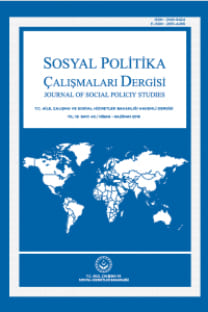CEPTEN SAĞLIK HARCAMASI YAPILMASINI BELİRLEYEN FAKTÖRLER: MİKRO VERİLER İLE TÜRKİYE ÖRNEĞİ
Cepten Sağlık Harcaması, Fiyat Farklılaşması, Hizmet Farklılaşması, Lojistik Regresyon Analizi
Determinants of Out of Pocket Expenditure Level: Evidence from Turkey
Logistic Regression Analysis, Out-of-Pocket Payments, Price Diversification, Service Diversification,
___
- Atasoy, D. (2001). Lojistik Regresyon Analizinin İncelenmesi ve Bir Uygulaması. Sivas: Cumhuriyet Üniversitesi Sosyal Bilimler Enstitüsü.
- Attia-Konan, A. R., Oga, A. S., Toure, A., & Kouadio, K. L. (2019). Distribution of Out of Pocket Health Expendituresin a Sub-Saharan Africa Country: Evidence from the National Survey of Household Satandard of Living, Cote d'Ivoire. BMC Research Notes, 12-25.
- Başara, B. B., & Şahin, İ. (2008). Türkiye'de Cepten Yapılan Sağlık Harcamalarını Etkileyen Etmenler. Hacettepe Üniversitesi İktisadi ve İdari Bilimler Fakültesi Dergisi, 26(2), 319-340.
- Bernabe, E., Masood, M., & Vujicic, M. (2017). The Impact of Out-of-Pocket Payment for Dental Care on Household Financesin Low and Middle Income Countries. BMC Public Health.
- Bose, M., & Dutta, A. (2018). Health Financing Strategies to Reduce Out of Pocket Burden in India: A Comparative Study of Three States. BMC Health Serices Research, 1-10.
- Brinda, E. M., Andres, R. A., & Enemark, U. (2014). Correlates Out-of-Pocket and Catastrophic Health Expenditures in Tanzania: Results from a National Household Survey. BMC International Health & Human Rights, 14(5).
- Çınaroğlu, S. (2018). Cepten Sağlık Harcamalarının Finansmanında Eşitsizlik ve Hakkaniyet: Uygulamalı Bir Ekonometrik Yaklaşım. İşletme Araştırmaları Dergisi, 876-897.
- Çokluk, Ö. (2010). Lojistik Regresyon Analizi: Kavram ve Uygulama. Kuram ve Uygulamada Eğitim Bilimleri, 10(3), 1357-1407.
- Dünya Sağlık Örgütü. (2018). https://www.who.int/health_financing/topics/financial-protection/out-of-pocket-payments/en/ (Erişim: 30.01.2019).
- Erus, B., & Aktakke, N. (2012). Impact of Healthcare Reforms on Out-of-Pocket Health Expenditures in Turkey For Public Insurees. The European Journal of Health Economics, 337-346.
- Field, A. (2005). Discovering Statistics Using SPSS (Cilt 2). London: Sage Publications.
- Goldman, D. P., & Zissimopoulos, J. M. (2003). High Out-of-Pocket Health Care Spending By the Elderly. Data Watch, 194-202.
- Hwang, W., Weller, W., Ireyes, H., & Anderson, G. (2001). Out-of-Pocket Medical Spending for Care of Chronic Conditions. Health Affairs, 267-278.
- Laokri, S., Soelaeman, R., & Hotchkiss, D. R. (2018). Assessing Out-of Pocket Expenditures for Primary Health Care: How Responsie is the Democratic Republic of
- Congo Health System to Providng Financ,al Risk Protection? BMC Health Services Research, 1-19.
- Lara, J. L. (2016). Catastrophic EXpenditure Due to Out-of-Pocket Health Paymnets and its Determinants in Colombian Households. International Journal for Equity in Health, 15(182).
- Mamun, S. A., Khanam, R., & Rahman, M. M. (2018). The Determinants of Household Out-of-Pocket (OOP) Medical Expenditure in Rural Bangladesh. Applied Health Economics and Health Policy, 16, 219-234.
- Mugisha, F., Kouyate, B., Gbangou, A., & Sauerborn, R. (2002). Examining Out-of-Pocket Expenditure on Health Care in Nouna, Burkino Faso: Implications for Health Policy. Tropical Medicine and International Health, 187-196.
- Organization, W. H. (2007). Sağlık ve İnsan Hakları Üzerine 25 Soru 25 Cevap. Toplum Sağlığı Araştırma ve Geliştirme Merkezi Derneği. https://apps.who.int/iris/bitstream/handle/10665/42526/9241545690_tur.pdf;jsessionid=84F99739E1780499D4EB37F35E97863B?sequence=10 adresinden alındı
- Paez, K. A., Zhao, L., & Hwang, W. (2009). Rising Out-of-Pocket Spending for Chronic Conditions: A Ten-Year Trend. Health Affairs, 28(1), 15-25.
- Rençber, Ö. F. (2018). Sınıflandırma Problemlerinde Çoklu Lojistik Regresyon, Yapay Sinir Ağı ve ANFIS Yöntemlerinin Karşılaştırılması: İnsani Gelişmişlik Endeksi Üzerine Uygulama. Ankara: Gazi Kitabevi.
- Rubio, R. d., Salido, R. M., Garcia, I. P., & Sotos, F. E. (2019). Catastrophic Long-Term Care Expenditure: Associated Socio-Demographic and Economic Factors. The European Journal of Health Economics.
- Sangar, S., Dutt, V., & Thakur, R. (2019). Coping with Out-of-Pocket Health Expendiure in India: Evidence from NSS 71st Round. Global Social Welfare.
- Sanwald, A., & Theurl, E. (2015). Out-of-Pocket Payments in the Austrian Healthcare System -A Distributional Analysis. International Journal for Equity in Health, 14(94).Sanwald, A., & Theurl, E. (2016). Out-of-Pocket Expenditure by Priate Householdsfor Denthal Services-Empirical Evidence from Austria. Health Economics Review, 6-10.Sene, L. M., & Cisse, M. (2015). Catastrophic Out-of-Pocket Payments for Health and Poverty Nexus: Evidence from Senegal. International Journal of Health Economics and Management, 15, 307-328.Şenel, S., & Alatlı, B. (2014). Lojistik Regresyon Analizinin Kullanıldığı Makaleler Üzerine Bir İnceleme. Eğitimde ve Psikolojide Ölçme ve Değerlendirme Dergisi, 5(1), 35-52.
- Tokatlıoğlu, Y., & Tokatlıoğlu, İ. (2018). Türkiye'de Katastrofik Sağlık Harcamaları ve Bu Harcamaları Belirleyen Faktörler. Sosyoekonomi, 26(35), 59-78.
- Türkiye İstatistik Kurumu.(2018). Sağlık Harcamaları İstatistikleri Haber Bülteni. https://www.tuseb.gov.tr/enstitu/tacese/yuklemeler/RAPORLAR/tuik_2018_saglik_harcamalari_2017.pdf . (Erişim: 31.01.2019).
- Yardım, M. S., Çilingiroğlu, N., & Yardım, N. (2010). Catastrophic Health Expenditure and Impoverishment in Turkey. Health Policy, 94, 26-33.
- Yereli, A. B., Köktaş, A. M., & Selçuk, I. Ş. (2014). Türkiye'de Katastrofik Sağlık Harcamalarını Etkileyen Faktörler. Sosyoekonomi, 273-296.
- Yıldırım, J., Yılmaz, E., & Korucu, N. (2011). The Determinants of Out-of-Pocket Payments: Evidence from Selected Hospitals in Ankara, Turkey. Applied Economics Letters, 1159-1162.
- You, X., & Kobayashi, Y. (2011). Determinants of Out-of-Pocket Health Expenditure in China: Analysis Using China Health and Nutrition Surey Data. Applied Health Economics and Health Policy, 9(1), 39-49.
- ISSN: 2148-9424
- Yayın Aralığı: Yılda 4 Sayı
- Başlangıç: 2012
- Yayıncı: Aile,Çalışma ve Sosyal Hizmetler Bakanlığı
KAYNAŞTIRMA ÖĞRENCİLERİNİN OKUMA EĞİTİMİNE YÖNELİK UYGULAMALAR
KAYNAŞTIRMA ÖĞRENCİLERİNE OKUMA BECERİSİ KAZANDIRMAYA YÖNELİK ÖĞRETMEN GÖRÜŞ VE UYGULAMALAR
CEPTEN SAĞLIK HARCAMASI YAPILMASINI BELİRLEYEN FAKTÖRLER: MİKRO VERİLER İLE TÜRKİYE ÖRNEĞİ
SOSYAL GÜVENLİK VE SAĞLIĞIN FİNANSMANI: 2000-2015 DÖNEMİNE İLİŞKİN DEĞERLENDİRME
KUŞAKLARARASI BAĞLAMDA BABALIK VE BABA- ÇOCUK İLİŞKİSİ
Yaşare AKTAŞ ARNAS, Seval ÖRDEK İNCEOĞLU
AVRUPA BİRLİĞİ CİNSİYET EŞİTLİĞİ İLKESİ PERSPEKTİFİNDEN TÜRK SOSYAL GÜVENLİK SİSTEMİ
Zeynep GÜNDER, Doç. Dr. Gamze AŞÇIOĞLU ÖZ
INTERGENERATIONAL FATHERHOOD AND FATHER-CHILD RELATIONSHIP
Seval ÖRDEK İNCEOĞLU, Yaşare AKTAŞ ARNAS
KUZEY AMERİKA ÜLKELERİNDE AİLE POLİTİKALARI: AMERİKA BİRLEŞİK DEVLETLERİ VE KANADA ÖRNEĞİ
